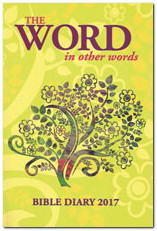THE WORD
Heb 13,1-8/ Mk 6,14-29
King Herod heard about it, for his fame had become widespread, and people were saying, “John the Baptist has been raised from the dead; that is why mighty powers are at work in him. Others were saying, “He is Elijah”; still others, “He is a prophet like any of the prophets.” But when Herod learned of it, he said, “It is John whom I beheaded. He has been raised up.”
Herod was the one who had John arrested and bound in prison on account of Herodias, the wife of his brother Philip, whom he had married. John had said to Herod, “It is not lawful for you to have your brother’s wife.” Herodias harbored a grudge against him and wanted to kill him but was unable to do so. Herod feared John, knowing him to be a righteous and holy man, and kept him in custody. When he heard him speak he was very much perplexed, yet he liked to listen to him. She had an opportunity one day when Herod, on his birthday, gave a banquet for his courtiers, his military officers, and the leading men of Galilee. Herodias’ own daughter came in and performed a dance that delighted Herod and his guests. The king said to the girl, “Ask of me Whatever you wish and I will grant it to you.” He even swore (many things) to her, “I will grant you whatever you ask of me, even to half of my kingdom. She Went out and said to her mother, “What shall I ask for?” She replied, “The head of John the Baptist.” The girl hurried back to the king’s presence and made her request, “I want you to give me at once on a platter the head of John the Baptist.”The king was deeply distressed, but because of his oaths and the guests he did not wish to break his word to her. So he promptly dispatched an executioner with orders to bring back his head. He went off and beheaded him in the prison. He brought in the head on a platter and gave it to the girl. The girl in turn gave it to her mother. When his disciples heard about it, they came and took his body and laid it in a tomb.
IN OTHER WORDS
Entering the clinic of my dentist, I was greeted by her new secretary and in haste gave me a paper bag saying, “Eto po angpinapadala ni Doc sa inyo!” (This is what the doctor wants you to deliver...) She thought I was the errand boy who was there to pick up a package. Later when she realized I wasn’t, she apologized. What an unforgettable mistake. If all our mistakes are unforgettable then they have served their purpose! When John was becoming famous, he was mistaken to be the Messiah. (Jn 1:19) When Jesus’ fame became widespread, he was mistaken to be John. What a mistake to speak of Messiah as Fame. It is the Crucified Lord, when stripped of all fame, that saved us. It is shame, not fame that makes a Messiah. The pain of “shame” or letting go of fame authenticates a Messiah. It is all about letting go. May we not repeat the same mistake again. “Ask of me anything you Want and I Will grant it to you,” promised the king. These words made Herod famous but not a Messiah. Fame is the natural habitat of a blotted ego. To avoid shame, he had to order the killing of an innocent man, John. How many have been sacrificed to avoid shame? To be a Messiah or Christ or Christian (a follower of Christ) means to take the shame for the sake of others, to take the burden and spare the other. It is also perhaps to be mistaken as an errand boy by the secretary and be recognized by the doctor when she comes.
• Fr. Aris Martin, SVD (USA)
The Word in other words 2017
An annual project of Logos Publications, The WORD in Other Words Bible Diary contains daily scripture readings and reflections written by priest, brothers, and sisters of the three congregations founded by St. Arnold Janssen (the SVD, SSpS, and SSpSAP). It hopes to serve as a daily companion to readers who continually seek the correlation of the Word of God and human experience.


